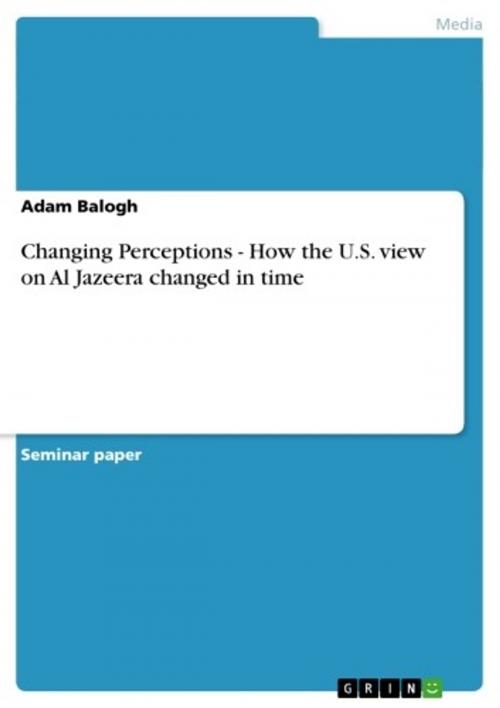Changing Perceptions - How the U.S. view on Al Jazeera changed in time
Nonfiction, Reference & Language, Language Arts, Communication| Author: | Adam Balogh | ISBN: | 9783656381839 |
| Publisher: | GRIN Verlag | Publication: | March 4, 2013 |
| Imprint: | GRIN Verlag | Language: | English |
| Author: | Adam Balogh |
| ISBN: | 9783656381839 |
| Publisher: | GRIN Verlag |
| Publication: | March 4, 2013 |
| Imprint: | GRIN Verlag |
| Language: | English |
Seminar paper from the year 2012 in the subject Communications - Media and Politics, Politic Communications, grade: A bzw. 1,3, Central European University Budapest (Department of Public Policy), course: Fundamentals of Media and Communications Policy, language: English, abstract: On 13 November 2001 a 230 kilograms heavy U.S. bomb hit the Kabul office of the TV channel Al Jazeera and destroyed the whole building (BBC 2001). Although the incident occurred during the U.S. invasion of Afghanistan, the station was located in a residential area and the Pentagon was informed about its location. International concerns rose up the next weeks and after BBC constantly brought new disclosures about the incident to light, the Pentagon relented and published an official statement in which it confirmed a deliberate destruction. In the eyes of the Pentagon and U.S. government the bombing was legitimate because in their estimation, Al Jazeera is as a part of the propaganda machine of the 'enemy', cooperating with terrorists (Miles 2005, 165-167). About 10 years later things seem to have changed a lot. In March 2011, U.S. Secretary of State Hillary Clinton testified in front of the Senate Foreign Relations Committee that Al Jazeera provided more informative news coverage than the opinion-driven coverage of American mass media (The Huffington Post 2011). However, she is not the only one whose perception about the TV channel seems to have changed in the last years. 'Defense Secretary Robert M. Gates, Army Gen. David H. Petraeus [...] and Adm. Michael G. Mullen, chairman of the Joint Chiefs of Staff, all have appeared on the network's Arabic and English channels in the last year.' writes the Los Angeles Times at the end of 2011 and claims that 'The Obama administration is courting the pan-Arab television network Al Jazeera in an attempt to improve a history of testy relations with one of the most influential news outlets in the Middle East.' (Los Angeles Times 2011).
Seminar paper from the year 2012 in the subject Communications - Media and Politics, Politic Communications, grade: A bzw. 1,3, Central European University Budapest (Department of Public Policy), course: Fundamentals of Media and Communications Policy, language: English, abstract: On 13 November 2001 a 230 kilograms heavy U.S. bomb hit the Kabul office of the TV channel Al Jazeera and destroyed the whole building (BBC 2001). Although the incident occurred during the U.S. invasion of Afghanistan, the station was located in a residential area and the Pentagon was informed about its location. International concerns rose up the next weeks and after BBC constantly brought new disclosures about the incident to light, the Pentagon relented and published an official statement in which it confirmed a deliberate destruction. In the eyes of the Pentagon and U.S. government the bombing was legitimate because in their estimation, Al Jazeera is as a part of the propaganda machine of the 'enemy', cooperating with terrorists (Miles 2005, 165-167). About 10 years later things seem to have changed a lot. In March 2011, U.S. Secretary of State Hillary Clinton testified in front of the Senate Foreign Relations Committee that Al Jazeera provided more informative news coverage than the opinion-driven coverage of American mass media (The Huffington Post 2011). However, she is not the only one whose perception about the TV channel seems to have changed in the last years. 'Defense Secretary Robert M. Gates, Army Gen. David H. Petraeus [...] and Adm. Michael G. Mullen, chairman of the Joint Chiefs of Staff, all have appeared on the network's Arabic and English channels in the last year.' writes the Los Angeles Times at the end of 2011 and claims that 'The Obama administration is courting the pan-Arab television network Al Jazeera in an attempt to improve a history of testy relations with one of the most influential news outlets in the Middle East.' (Los Angeles Times 2011).















